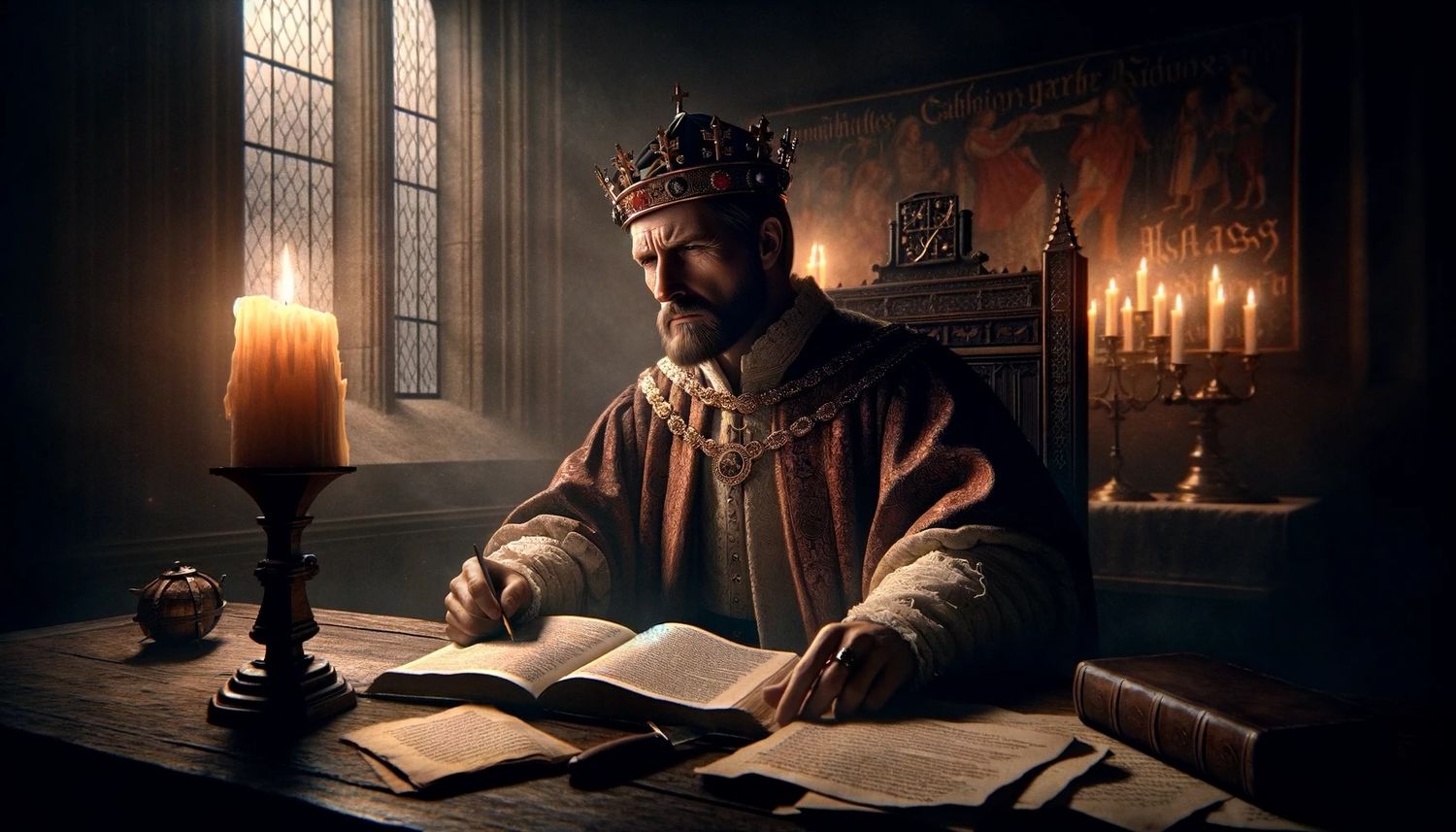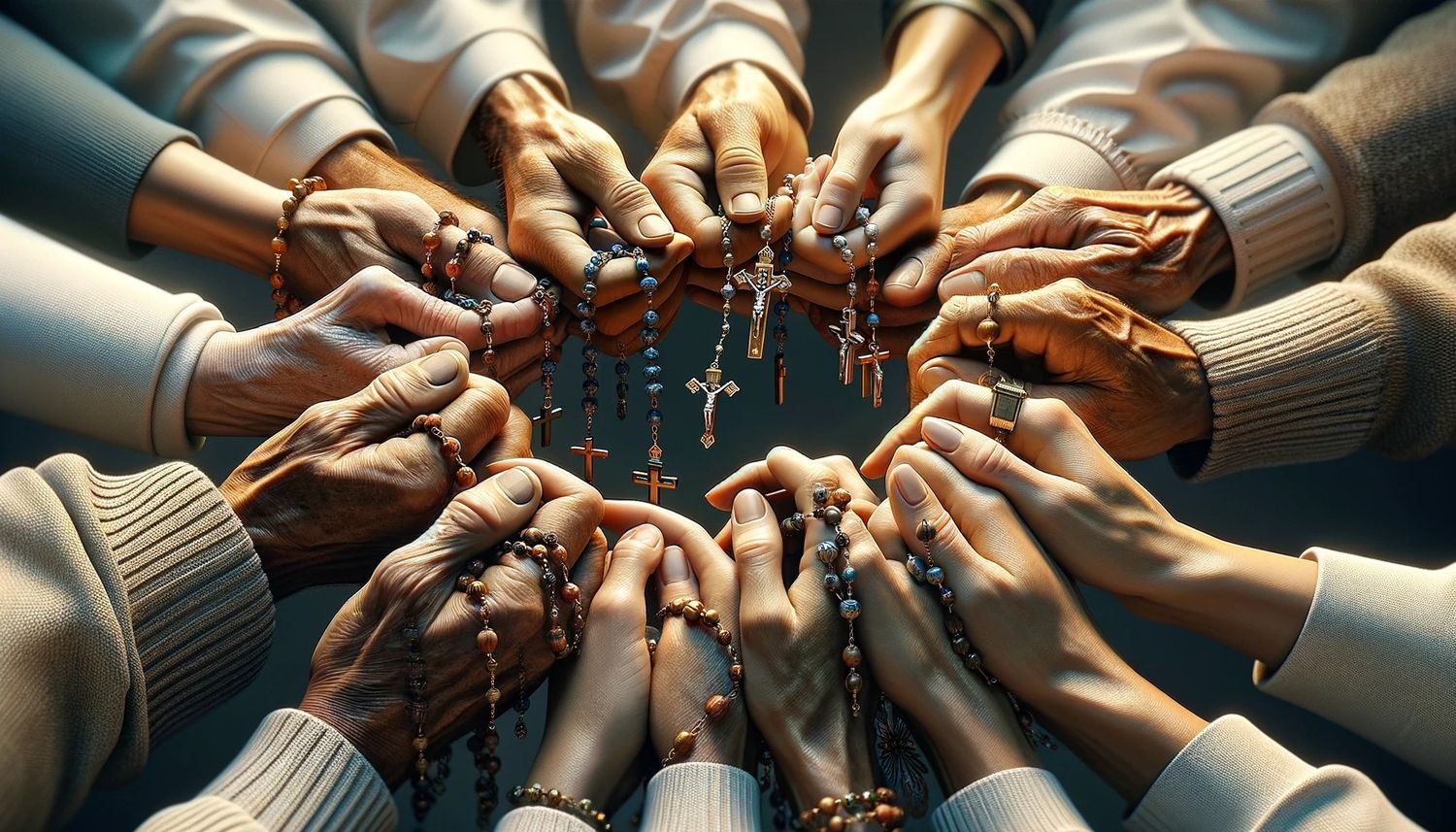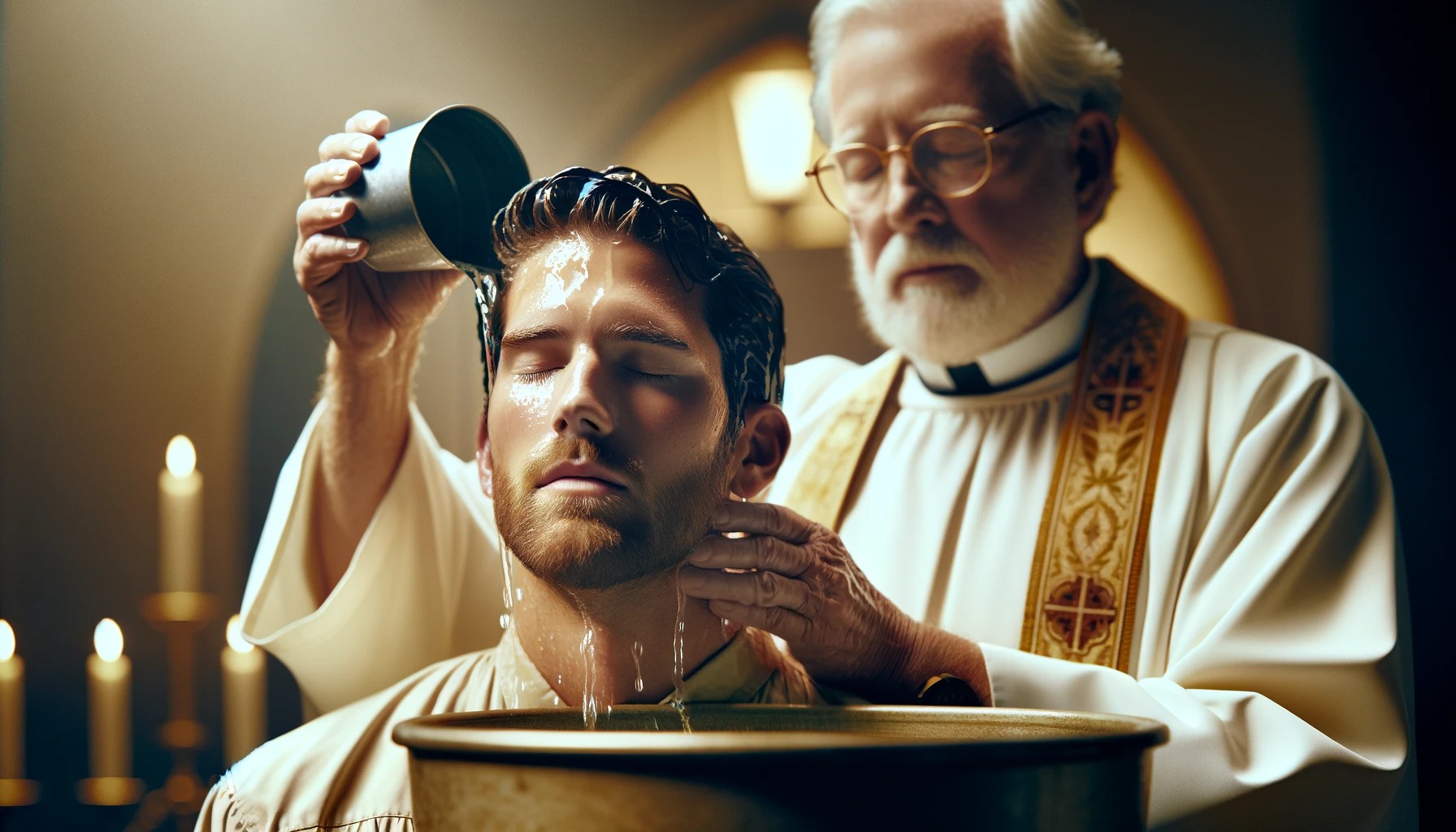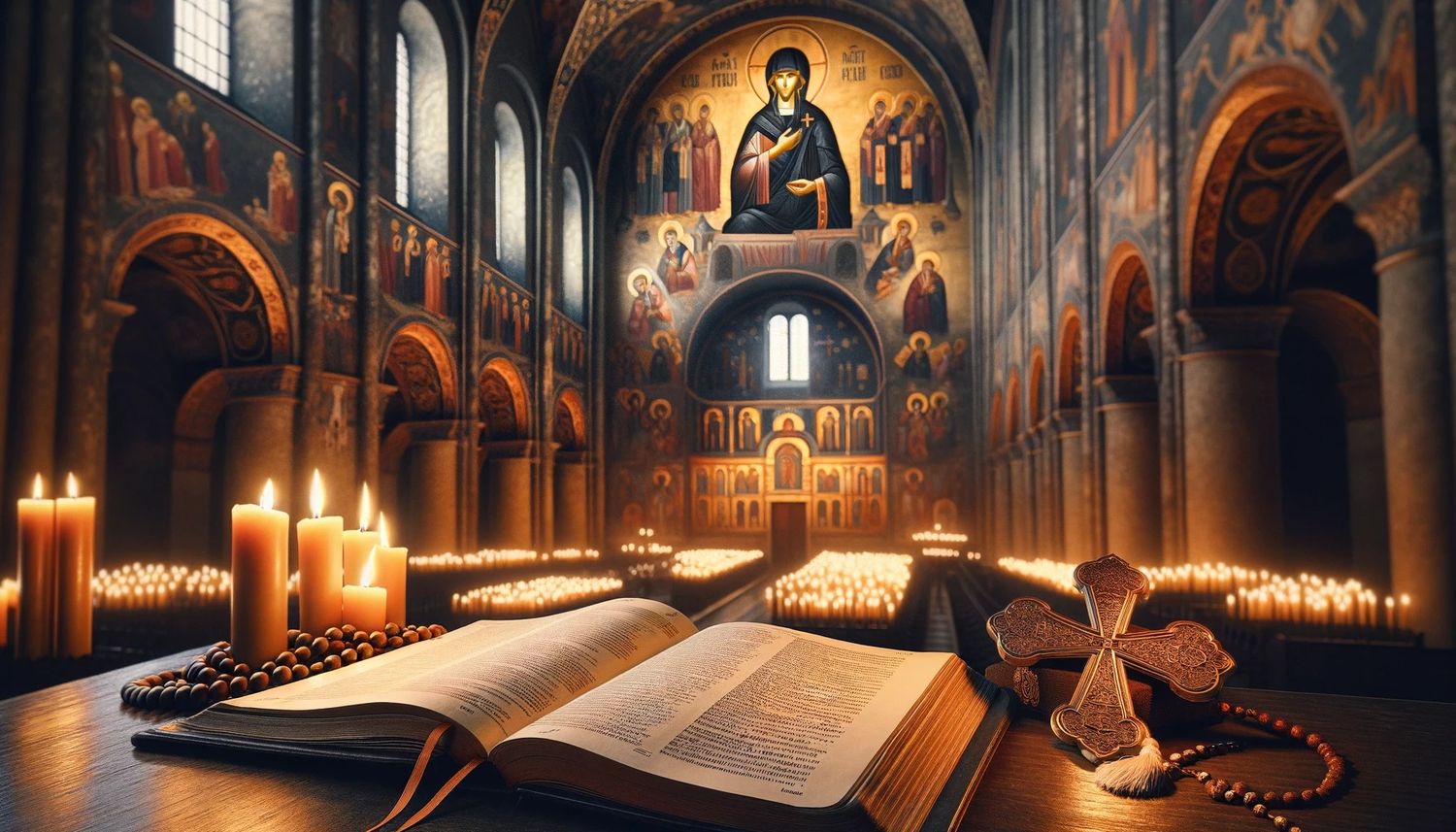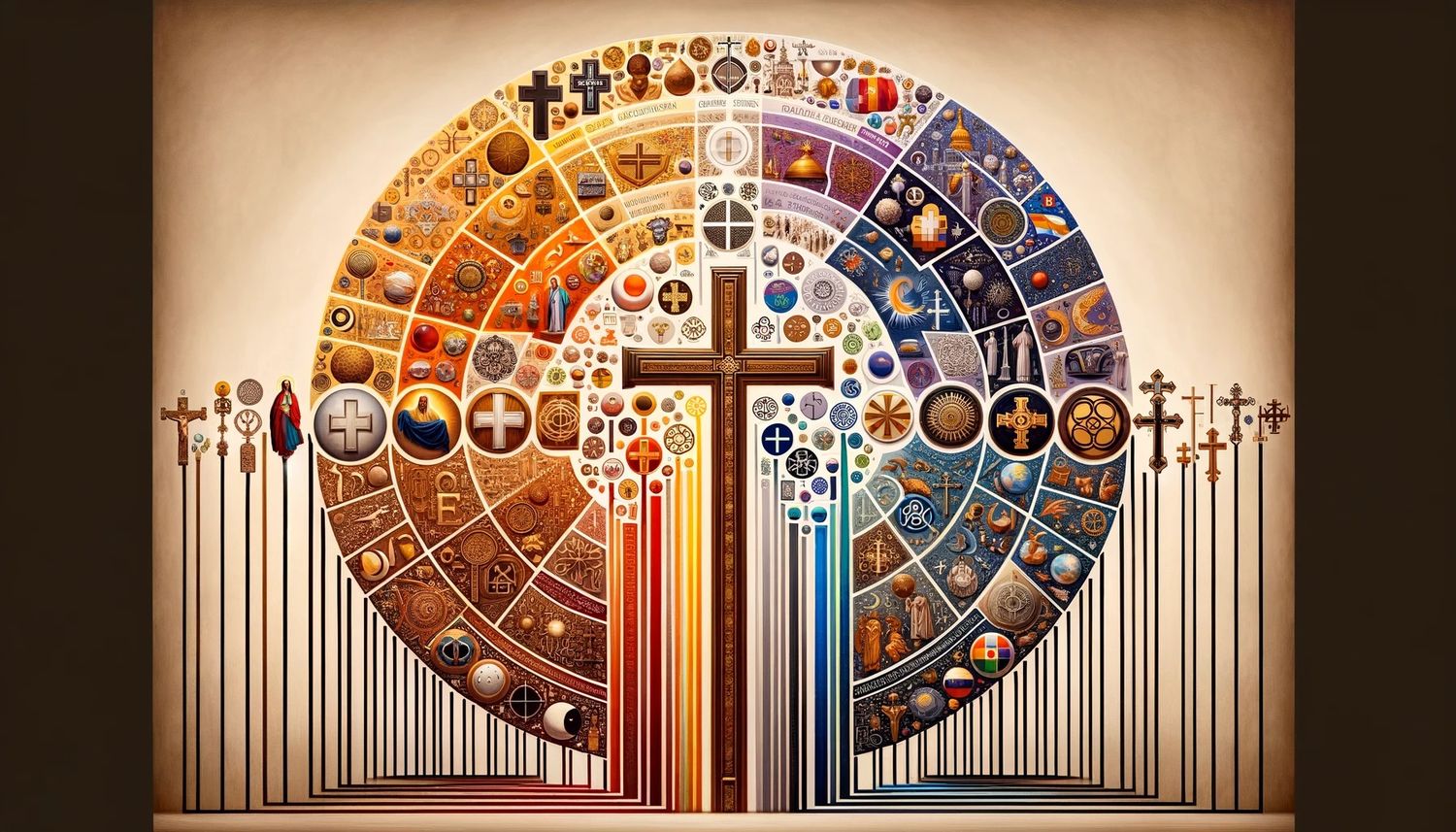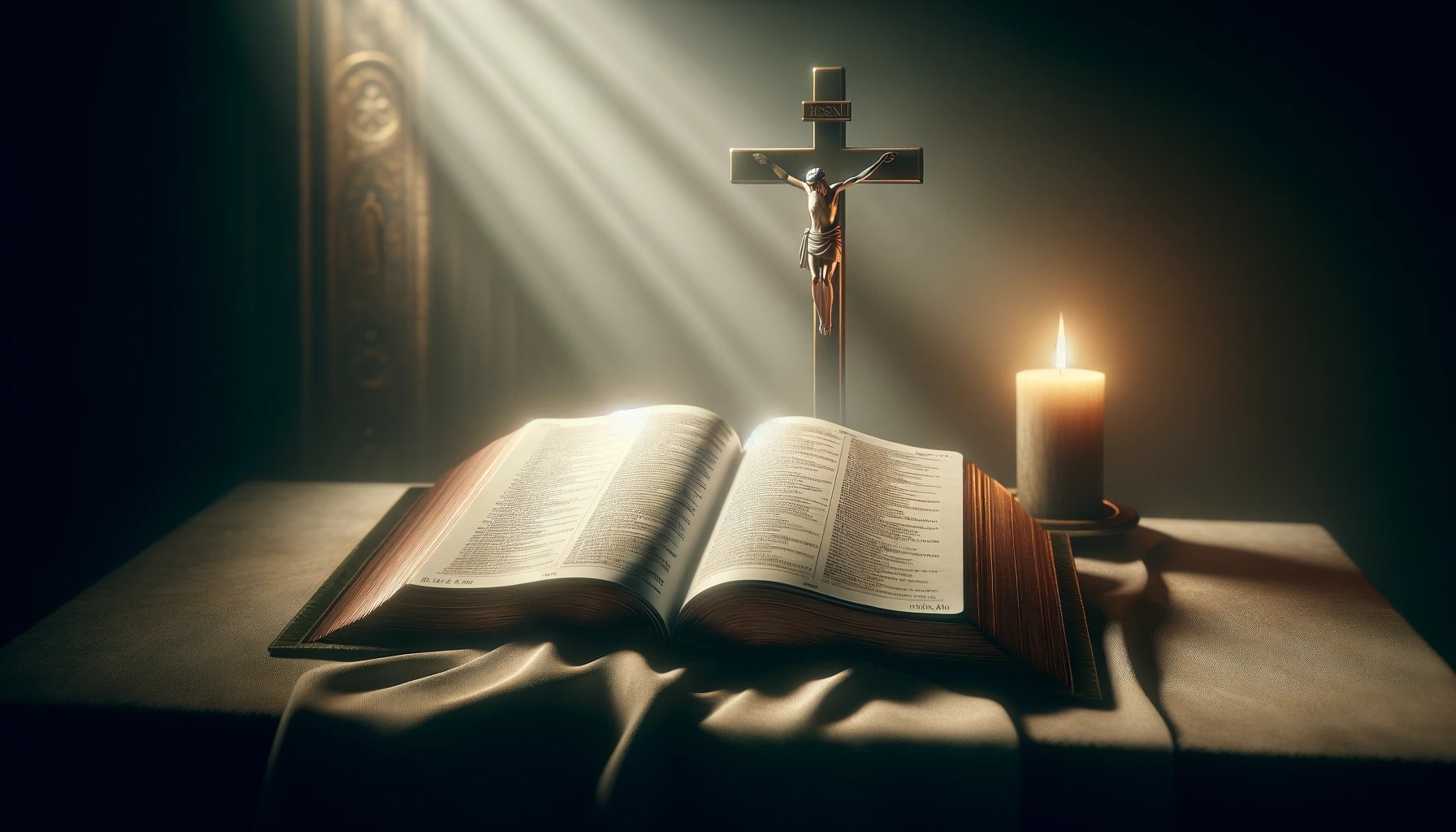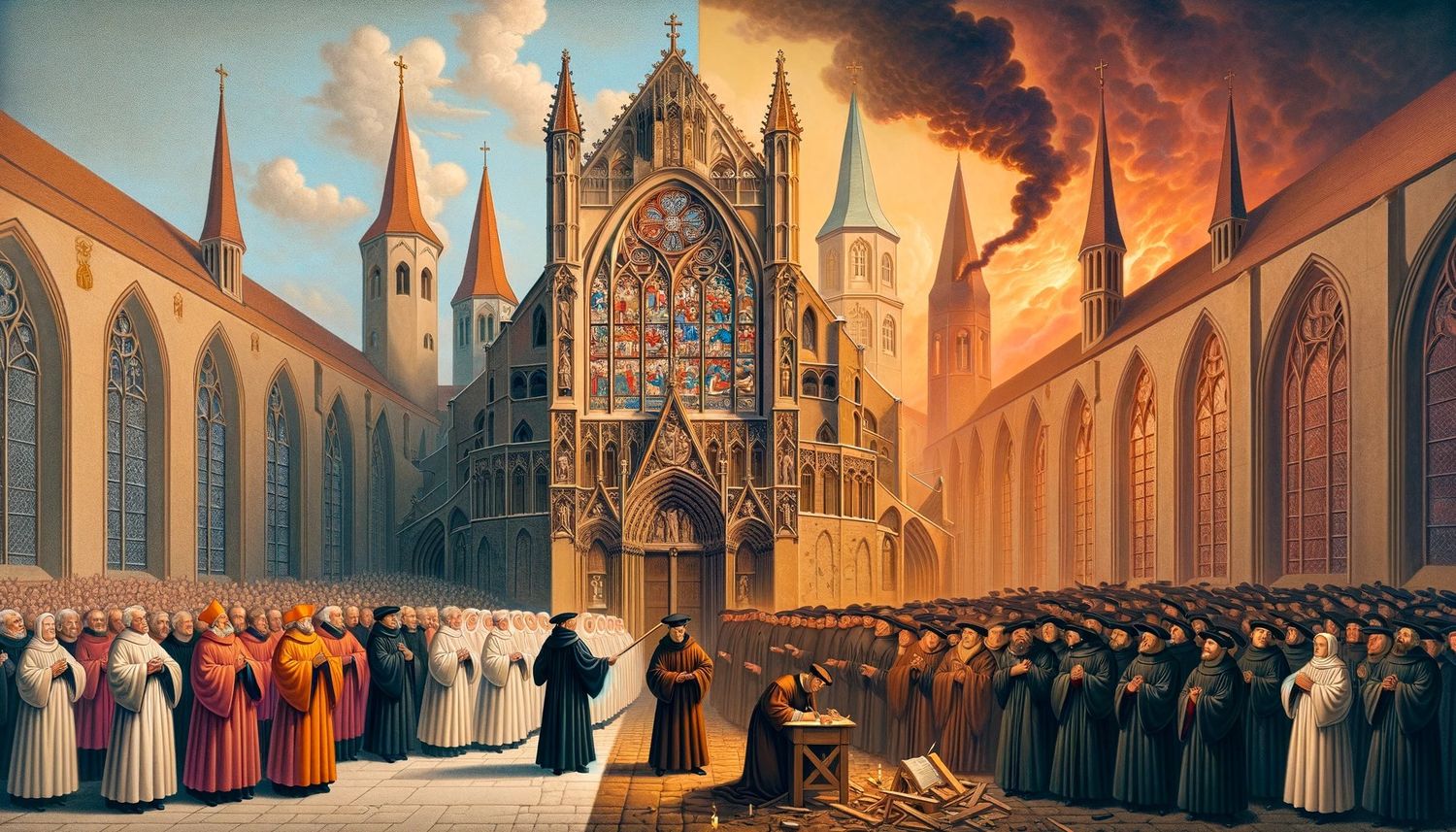Home>Theology and Spirituality>Why Convert To Catholicism
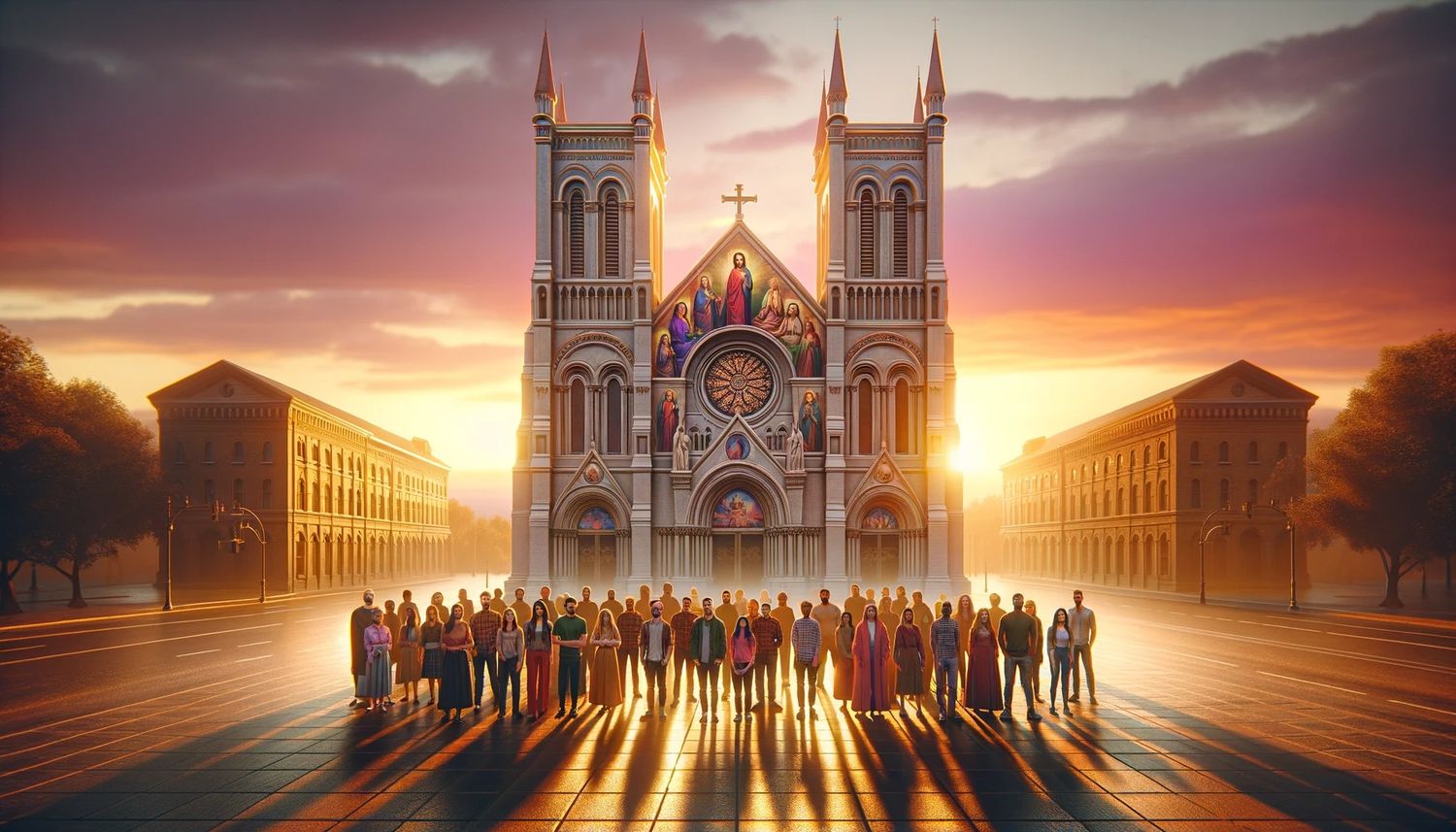

Theology and Spirituality
Why Convert To Catholicism
Published: February 17, 2024
Jason DeRose, Managing Editor at Christian.net, uses his expertise in religion and journalism to deepen understanding of faith's societal impacts. His editorial leadership, coupled with a strong academic background, enriches the platform’s diverse content, earning him recognition in both journalism and religious circles.
Discover the theology and spirituality behind converting to Catholicism. Explore the reasons and benefits of embracing the Catholic faith.
(Many of the links in this article redirect to a specific reviewed product. Your purchase of these products through affiliate links helps to generate commission for Christian.net, at no extra cost. Learn more)
Table of Contents
Introduction
Catholicism, with its rich history and profound spiritual traditions, has captivated the hearts and minds of countless individuals around the world. It is a faith that encompasses deep-rooted traditions, profound rituals, and a strong sense of community. The decision to convert to Catholicism is a significant and deeply personal one, often influenced by a variety of factors including spiritual yearning, a desire for a sense of belonging, and a quest for deeper meaning in life.
The journey of conversion to Catholicism is a transformative experience that often begins with a profound inner calling. It is a path that leads individuals to explore the teachings, traditions, and spiritual practices that have shaped the lives of millions for centuries. The decision to embrace Catholicism is not merely a change in religious affiliation; rather, it is a profound spiritual awakening that can bring about a sense of purpose, belonging, and fulfillment.
As we delve into the history, beliefs, and practices of Catholicism, we will uncover the profound wisdom and spiritual richness that have drawn countless individuals to this faith. We will explore the reasons why people choose to convert to Catholicism, the challenges they may encounter along the way, and the myriad of benefits that this spiritual journey can bring. Whether it is the allure of ancient traditions, the comfort of a supportive community, or the profound spiritual teachings, the decision to convert to Catholicism is a deeply personal and transformative choice that has the potential to enrich one's life in profound ways.
Read more: Why Did Clovis Convert To Catholicism
History of Catholicism
The history of Catholicism is a tapestry woven with the threads of ancient traditions, profound spirituality, and enduring influence. Its roots can be traced back to the life and teachings of Jesus Christ, whose ministry in the 1st century laid the foundation for the Christian faith. The term "Catholic" itself is derived from the Greek word "katholikos," meaning "universal," reflecting the faith's global reach and inclusive nature.
Catholicism's early development was marked by the spread of Christianity throughout the Roman Empire, despite periods of persecution. In the 4th century, Emperor Constantine's Edict of Milan granted Christians the freedom to practice their faith, paving the way for the Church's growth and influence. The Council of Nicaea in 325 AD played a pivotal role in defining key aspects of Christian doctrine, solidifying the Church's theological framework.
The establishment of the papacy, with St. Peter recognized as the first Bishop of Rome, laid the groundwork for the centralization of authority within the Church. Over the centuries, the papacy became a symbol of unity and continuity, guiding the faithful through times of upheaval and transformation.
The Middle Ages saw the flourishing of monasticism, the rise of scholasticism, and the construction of magnificent cathedrals that stand as testaments to the enduring legacy of Catholicism. The Church's influence extended into every aspect of medieval society, shaping art, architecture, and the intellectual pursuits of the era.
The Protestant Reformation in the 16th century brought about a significant schism within Western Christianity, leading to the emergence of various Protestant denominations. This period of upheaval prompted the Catholic Church to engage in a process of renewal and reform known as the Counter-Reformation, reaffirming its core teachings and addressing internal challenges.
In modern times, the Second Vatican Council in the 1960s ushered in a period of renewal and adaptation, seeking to engage with the contemporary world while upholding the timeless truths of the faith. Today, Catholicism continues to be a global force, with over a billion adherents worldwide, encompassing diverse cultures and traditions under the unifying umbrella of the Church.
The history of Catholicism is a testament to the enduring power of faith, the resilience of tradition, and the capacity for spiritual renewal. It is a story of triumphs and challenges, of continuity and adaptation, shaping the lives of countless individuals across the centuries and offering a profound legacy of wisdom and inspiration.
Beliefs and Practices of Catholicism
Catholicism is characterized by a rich tapestry of beliefs and practices that form the spiritual foundation of the faith. At the core of Catholic belief is the affirmation of the Holy Trinity, acknowledging God as Father, Son, and Holy Spirit. This foundational doctrine underscores the divine nature of God and the interconnectedness of the three persons within the Godhead.
The sacramental life of Catholicism is central to the faith, with the seven sacraments serving as visible signs of God's grace at work in the world. These sacraments, including Baptism, Confirmation, Eucharist, Reconciliation, Anointing of the Sick, Holy Orders, and Matrimony, are pivotal moments in the lives of believers, marking significant milestones in their spiritual journey.
The veneration of Mary, the mother of Jesus, holds a special place in Catholic devotion. Mary is revered as the Theotokos, the Mother of God, and her intercessory role is deeply cherished within the Catholic tradition. The recitation of the Rosary, a form of meditative prayer centered on the life of Christ and the intercession of Mary, is a cherished practice among Catholics worldwide.
The liturgical life of the Church is marked by the celebration of the Eucharist, also known as the Mass, which holds a central place in Catholic worship. The Eucharist is regarded as the source and summit of the Christian life, representing the real presence of Christ in the consecrated elements of bread and wine.
Catholic moral teachings, rooted in the natural law and informed by Scripture and tradition, provide ethical guidance for believers in navigating the complexities of human existence. The principles of social justice, care for the marginalized, and the sanctity of human life are integral to Catholic social teaching, reflecting a commitment to upholding the dignity of every person.
The spiritual practices of prayer, fasting, and almsgiving are emphasized during the liturgical seasons of Lent and Advent, providing opportunities for believers to deepen their spiritual lives and cultivate a spirit of repentance, anticipation, and generosity.
The beliefs and practices of Catholicism encompass a diverse array of devotional traditions, theological insights, and ethical principles, offering a comprehensive framework for spiritual growth and moral living. These foundational elements form the bedrock of Catholic identity, shaping the lives of believers and fostering a deep sense of communion with God and the Church.
Reasons for Converting to Catholicism
The decision to convert to Catholicism is often deeply personal, influenced by a myriad of factors that resonate with the spiritual, emotional, and intellectual needs of individuals. Here are compelling reasons why many choose to embrace the Catholic faith:
-
Rich Theological Tradition: Catholicism boasts a profound theological heritage, encompassing the writings of influential theologians such as St. Augustine, St. Thomas Aquinas, and numerous others. The depth and breadth of Catholic theological thought offer a robust framework for understanding the mysteries of faith, drawing seekers who yearn for intellectual engagement and spiritual depth.
-
Sacramental Life: The sacraments, particularly the Eucharist, hold a central place in Catholic spirituality. The tangible experience of God's grace through the sacraments, along with the belief in the real presence of Christ in the Eucharist, resonates deeply with those seeking a tangible and transformative encounter with the divine.
-
Historical Continuity: The unbroken historical lineage of the Catholic Church, tracing its origins to the apostolic era, appeals to individuals seeking a sense of continuity with the early Christian community. The connection to the ancient traditions and practices of the Church offers a profound sense of rootedness and historical authenticity.
-
Community and Fellowship: The strong sense of community and fellowship within Catholic parishes and communities provides a supportive and nurturing environment for individuals seeking a spiritual home. The communal aspect of Catholicism fosters a sense of belonging and shared faith experiences.
-
Devotional Practices: The rich tapestry of devotional practices within Catholicism, including the veneration of saints, the recitation of the Rosary, and the observance of liturgical seasons, offers a diverse array of spiritual expressions that resonate with individuals seeking a holistic and embodied approach to faith.
-
Intellectual and Moral Framework: The ethical and moral teachings of Catholicism, rooted in natural law and informed by Scripture and tradition, provide a robust framework for ethical decision-making and social engagement. The intellectual rigor of Catholic moral theology appeals to those seeking a comprehensive ethical worldview.
-
Beauty and Sacred Art: The aesthetic richness of Catholic liturgy, architecture, and sacred art, including awe-inspiring cathedrals, intricate artwork, and sacred music, captivates individuals with a deep appreciation for the transcendent beauty and the capacity of art to elevate the soul.
-
Seeking Spiritual Depth: Many individuals are drawn to Catholicism in their quest for spiritual depth, seeking a faith tradition that offers contemplative practices, mystical insights, and a profound sense of the sacred that permeates everyday life.
The decision to convert to Catholicism is a deeply transformative journey, shaped by a convergence of spiritual, intellectual, and communal factors that resonate with the deepest longings of the human heart.
Challenges of Converting to Catholicism
Embarking on the journey of converting to Catholicism can present individuals with a set of unique challenges that require thoughtful consideration and introspection. These challenges, while not insurmountable, are integral to the process of embracing a new faith tradition and navigating the complexities of spiritual transformation.
One of the primary challenges faced by individuals considering conversion to Catholicism is the adjustment to the rich tapestry of Catholic beliefs and practices. The theological depth and complexity of Catholic teachings, including the doctrines surrounding the Holy Trinity, the sacraments, and the veneration of Mary, may present a significant learning curve for those coming from different religious backgrounds. Understanding and internalizing these foundational aspects of Catholicism require patience, open-mindedness, and a willingness to engage in theological exploration.
Another challenge that individuals may encounter is reconciling their previous religious or spiritual experiences with the tenets of Catholicism. For those coming from Protestant, Eastern Orthodox, or non-Christian backgrounds, embracing Catholicism involves navigating the differences in liturgical worship, doctrinal emphases, and spiritual practices. This process of reconciling past beliefs with the teachings of the Catholic Church can be emotionally and intellectually demanding, requiring individuals to engage in deep introspection and discernment.
The communal aspect of Catholicism, while a source of strength and support, can also present challenges for newcomers. Integrating into a new faith community, building relationships with fellow parishioners, and adapting to the dynamics of Catholic parish life may pose social and cultural adjustments. Finding a sense of belonging within the diverse tapestry of the Catholic Church requires patience, humility, and a willingness to embrace the communal aspects of faith.
Additionally, the decision to convert to Catholicism may evoke familial, social, or cultural tensions for some individuals. Family dynamics, cultural expectations, and social circles rooted in different religious traditions can create internal and external pressures as individuals navigate their newfound faith journey. The process of conversion may require individuals to navigate sensitive conversations, address potential misunderstandings, and seek support in the face of relational complexities.
Navigating the challenges of converting to Catholicism demands a spirit of openness, humility, and a willingness to engage in a process of spiritual and personal transformation. While these challenges may present moments of uncertainty and introspection, they also offer opportunities for growth, self-discovery, and a deepening of faith that can ultimately enrich the spiritual journey of those embracing the Catholic faith.
Read more: Why Did James II Convert To Catholicism
Benefits of Converting to Catholicism
The decision to convert to Catholicism offers a myriad of profound and transformative benefits that resonate deeply with individuals seeking spiritual enrichment, communal belonging, and a holistic framework for living out their faith. Embracing the Catholic faith can bring about a profound sense of spiritual fulfillment, personal growth, and a deepening connection to the timeless traditions and teachings of the Church.
One of the central benefits of converting to Catholicism is the opportunity for a deep and meaningful encounter with the divine through the sacramental life of the Church. The sacraments, particularly the Eucharist, serve as tangible expressions of God's grace, offering believers a transformative experience of encountering Christ in a deeply personal and profound manner. The sacramental life of Catholicism provides a rich tapestry of spiritual nourishment, guiding individuals on a journey of spiritual growth and intimacy with God.
Furthermore, the communal aspect of Catholicism fosters a sense of belonging and support within a vibrant and diverse faith community. Converting to Catholicism opens the door to a network of fellow believers who offer companionship, guidance, and a shared journey of faith. The sense of community within Catholic parishes and communities provides a nurturing environment for individuals to cultivate meaningful relationships, find support in times of need, and engage in collective acts of worship and service.
The intellectual and moral framework of Catholicism offers a robust foundation for ethical living, intellectual engagement, and a comprehensive worldview that addresses the complexities of human existence. The rich theological tradition of the Church, coupled with its commitment to social justice and the sanctity of human life, equips individuals with a moral compass and an intellectual framework for navigating the challenges of the modern world.
Moreover, the spiritual depth and contemplative practices within Catholicism provide individuals with a pathway to cultivate a profound sense of inner peace, spiritual growth, and a heightened awareness of the sacred in everyday life. The devotional practices, liturgical rhythms, and opportunities for prayer and reflection offer a holistic approach to spiritual nourishment, guiding individuals on a transformative journey of inner renewal and spiritual depth.
In essence, the benefits of converting to Catholicism encompass a holistic and transformative experience that encompasses spiritual enrichment, communal support, ethical guidance, and a deep sense of belonging within a vibrant faith community. The decision to embrace Catholicism is a journey that holds the potential to enrich every aspect of one's life, fostering a deep sense of spiritual fulfillment, personal growth, and a profound connection to the timeless wisdom and traditions of the Catholic Church.
Conclusion
The decision to convert to Catholicism is a deeply personal and transformative journey that encompasses a profound exploration of faith, tradition, and spiritual longing. As individuals embark on this path of conversion, they are met with the rich tapestry of Catholic beliefs, practices, and communal life, offering a holistic framework for spiritual growth and personal enrichment.
Throughout history, Catholicism has stood as a beacon of continuity, resilience, and spiritual depth, drawing individuals from diverse backgrounds into its embrace. The theological richness, sacramental life, and moral teachings of the Church provide a robust foundation for ethical living, intellectual engagement, and a deep encounter with the divine. The communal aspect of Catholicism fosters a sense of belonging, support, and shared faith experiences within a vibrant and diverse faith community.
The decision to convert to Catholicism is not without its challenges, as individuals navigate the complexities of theological learning, communal integration, and familial dynamics. However, these challenges offer opportunities for growth, self-discovery, and a deepening of faith that can ultimately enrich the spiritual journey of those embracing the Catholic faith.
Ultimately, the benefits of converting to Catholicism are manifold, encompassing a profound sense of spiritual fulfillment, personal growth, and a deepening connection to the timeless traditions and teachings of the Church. The decision to embrace Catholicism opens the door to a transformative experience of encountering the divine, cultivating meaningful relationships within a supportive faith community, and engaging in a holistic approach to spiritual nourishment and ethical living.
As individuals embrace the Catholic faith, they become part of a global community that spans continents, cultures, and centuries, united by a shared commitment to the teachings of Christ and the enduring legacy of the Church. The decision to convert to Catholicism is a testament to the enduring power of faith, the resilience of tradition, and the capacity for spiritual renewal, offering individuals a profound sense of purpose, belonging, and fulfillment on their spiritual journey.



